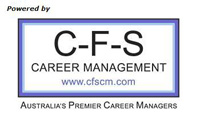Getting Help
Overview
General
Government organisations typically have unique application hurdles that need to be successfully navigated if you wish to be employed by them. Moving from a period of employment with Government to the private sector can also pose challenges. Whether you are wanting in or out, we can help you.
To find out more, contact info@cfscm.com
Help To Get In Or Get Out
Getting In
If you are looking to move from the private to the public sector, then it is vital that your application meets the organisation's strict assessment requirements.
As part of the selection process you will need to address the specified Selection Criteria.
Answering selection criteria can be quite a daunting task, not to mention time consuming and frustrating.
If you are currently within the public sector, then you already understand the process and how incredibly difficult it is to produce a quality application. No matter how suitably qualified you are, if your responses do not answer the questions with a focus on your achievements and suitability against each criterion, then your application will not succeed.
If you apply for a role in the Australian Public Service, you may be required to submit an application that addresses specific selection criteria. Selection criteria describe the personal qualities, skills, abilities, knowledge and qualifications a person needs to perform the role. Applicants are short-listed based on their ability to demonstrate the capabilities required against each selection criteria.
Selection criteria are often divided into:
-
Essential criteria (‘critical/must have’ criteria).
-
Desirable criteria (‘nice to have’ criteria).
When submitting your application you must meet all of the ‘essential’ criteria in order to be considered for the role. Whilst it is not necessary for you to have the qualifications, skills and knowledge outlined in ‘desirable’ criteria, your chances of progressing through the selection process will be greater if you meet all the selection criteria.
If you need professional help, contact info@cfscm.com
Getting Out
Transitioning from employment in specific areas of the Government will often require a unique set of strategies.
Leaving the Australian Defence Force (ADF), will require:
-
Identification of transferable skills
-
Development of job search strategies
-
Effective self-marketing techniques and
-
Resume development and interview skills preparation
CFS Career Management has a long history of working with ADF personnel and have specific programs to facilitate the transition to civilian employment on separation. They offer Career Transition Management Coaching which is invaluable for departing members who require intensive support and career direction on leaving the service.
For more information, click on the link and submit an on-line enquiry.
http://www.cfscm.com.au/services/adf.htm
Addressing Selection Criteria
The key to addressing selection criteria is to:
-
demonstrate capability by providing evidence of how you meet each selection criteria;
-
provide specific details; and
-
where possible, include an indicator of success or a result.
An easy way to do this is to use the STAR model – that is:
Situation – provide a brief outline of the situation or setting
Task – outline what you did
Approach or action – outline how you did it
Result – describe the outcomes.
Key Steps to writing Selection Criteria
Step 1 – Understanding the selection criteria
It is important that you clearly understand what is meant by each selection criterion before putting pen to paper.
Step 2 – Opening statement
When addressing each selection criterion, you should begin with an opening sentence that clearly states your claim to this criterion. For example:
I possess outstanding analytical and problem solving skills developed through my studies and applied to my work at all levels.
This opening statement needs to be supported by detailed examples of where you demonstrated these skills in the workplace.
Step 3 – Identify examples
For each selection criterion, identify examples from the last two or three years of employment. Where you do not have relevant work examples, identify situations from different aspects of your life (e.g. university, community or voluntary work) that may demonstrate and support relevant strengths. For instance, acting as treasurer at university may be an appropriate example for the selection criterion described above.
At this stage, it is useful to generate as many examples as possible.
Step 4 – Provide the evidence
Now you should expand upon the points that you have noted in step three. Go back to each specific criterion and choose your relevant examples by matching them against the wording of the criterion.
Step 5 - Matching
Once you have finalised your examples, you need to demonstrate how they meet the different aspects of the criterion. It is important that you are specific and describe exactly what you did, including the outcome. This is to demonstrate that you have met the requirements of each criterion.
Step 6 – Review
Read through your application, and check the following points:
-
It is important that you avoid ambiguous or unclear expressions such as ‘involved in’ or ‘assisted’. These expressions make it difficult for the reader to understand exactly what you did.
-
Avoid using passive language when describing your experience. For example, ‘I received consistently excellent feedback in relation to this initiative from my manager’, is better than simply stating, ‘Feedback in relation to this initiative was consistently excellent’.
-
Ensure all claims about your capabilities are supported.
-
Presentation: You should ensure that:
-
there are no spelling errors anywhere in the document;
-
the document is formatted neatly;
-
the sentences are grammatically correct;
-
the layout and length of the document meet the requirements stipulated by the organisation.
For assistance, advice, guidance, proof-reading and editing of your Selection Criteria.
If you need professional help contact info@cfscm.com
We have provided you with some key links to career related websites. Check them out if you think they might be able to help you further.
myfuture

myfuture is Australia’s national career information and exploration service, helping people to make career decisions, plan career pathways and manage work transitions. The site is for anyone who needs information to support their own or others’ career planning.
You will find detailed career information about occupations, industries, education and training providers, courses and programs, information about career development, choosing school subjects, getting a job, starting your own business, working overseas and many other topics, and links to other useful websites.
Click on link: http://www.myfuture.edu.au
Bored of Studies

Created by students, for students, Bored of Studies strives to provide current year 12 and year 11 students with all the resources and support they need to succeed during the 2 years that form the most important part of their education and subsequently, their futures.
Along with the help of countless user submitted notes and documents, and the users who spend endless hours helping out those in need in the student forums, Bored of Studies endeavours to become the single most influential, resourceful and helpful service available to students all over Australia.
Click on link: http://www.boredofstudies.org/
Graduate Careers Australia

Graduate Careers Australia’s mission is to be the leading authority on the supply of, and demand for, new graduates in Australia: and to use this position to foster employment and career opportunities for graduates, in association with the higher education sector, government and business.
They provide resources and advice for those wishing to recruit graduates, as well as high quality careers education products and services. They also research first destinations and salaries of graduates and interpret trends in employment with special reference to graduate employment, as well as forming a pro-active networking facility for all parties involved in graduate employment and training.
Click on link: http://www.graduatecareers.com.au/
Training.com.au

Training.com.au provides a single point of access to the vast range of vocational education and training information, products and services in Australia.
The portal was developed in conjunction with state and territory training authorities and the Australian National Training Authority. It is a gateway to many different websites and services.
Click on link:
http://www.training.com.au/portal/site/public/menuitem.118e29e68c7b0615af17bfae17a62dbc/

If your uni days are soon to be (or almost) behind you, its important that those years spent studying finally pay off.
Not only will you want to start your career off with a bang, you’ll also want to ensure you are fully versed on your options, know how to tackle the market and set yourself up well for a long and fulfilling working life.
Think you could do with a hand sorting through the maze? Contact info@cfsm.com and a professional adviser will sort you out.

If you are working abroad or have recently returned from an overseas assignment lasting longer than one year, you may feel you have lost touch with your network and the job scene in Australia. You may also have underestimated the length of time or difficulty of your job search if you are currently job hunting.
C-F-S Career Management has achieved consistent success in helping returning expatriates re-establish their careers in Australia. Their services are equally effective with expatriates still working abroad and those who have recently returned. Their consulting services enable returning expatriates to sell their overseas experiences to Australian organisations.
To find out more click here: http://www.cfscm.com.au/services/expatriates.htm

Your career is likely to be your biggest lifetime investment in terms of the time and talent you put into it. Capitalising on that investment requires proactive management. This also takes time, which is often a rare commodity for busy executives and professionals. That's where C-F-S Executive can help.
C-F-S Executive is dedicated to providing high-level consulting expertise to senior executives and professionals who require career direction, discrete personal marketing services, mentoring and ongoing guidance for the remainder of their career.
Their passion is to enable talented individuals to achieve exceptional career outcomes, so they work for the individual, not the employer.
Their Executive Programs are designed to assist all levels of senior managers and professionals, bureaucrats and expatriates who are looking for:
-
Career advancement or transition
-
Career control and direction
-
Partnership and guidance during career search
-
Assistance with age-related job hunting obstacles
-
Career continuity on migrating or returning to Australia
-
Strengthening your prospects in an area of expertise
-
Mentoring for your career challenges or problems
-
Improved levels of confidence, self-marketing and networking abilities
-
Outplacement assistance upon termination of employment
-
A dedicated Senior Executive Consultant will work in partnership with you until a satisfactory career outcome is achieved, no matter how long it takes
To find out how our C-F-S Executive might help you in moving your career forward, we invite you to register for a confidential, no obligation preliminary discussion.
Click on the link: http://www.cfsexecutive.com/executive-programs/register.php

If a seat on the board is your focus, getting there and staying there is not something that just happens. It is critical that your networks and personal brand are honed to deliver results.
C-F-S Executive Programs are designed to give you a clear career advantage. Their programs are based on a strategic approach that will uncover your unique selling points to ensure you achieve your desired career goal and connect you with the right people.
They also have strong links with the Australian Institute of Company Directors and facilitate various networking opportunities.
For further information contact: info@cfsexecutive.com or visit www.cfsexecutive.com